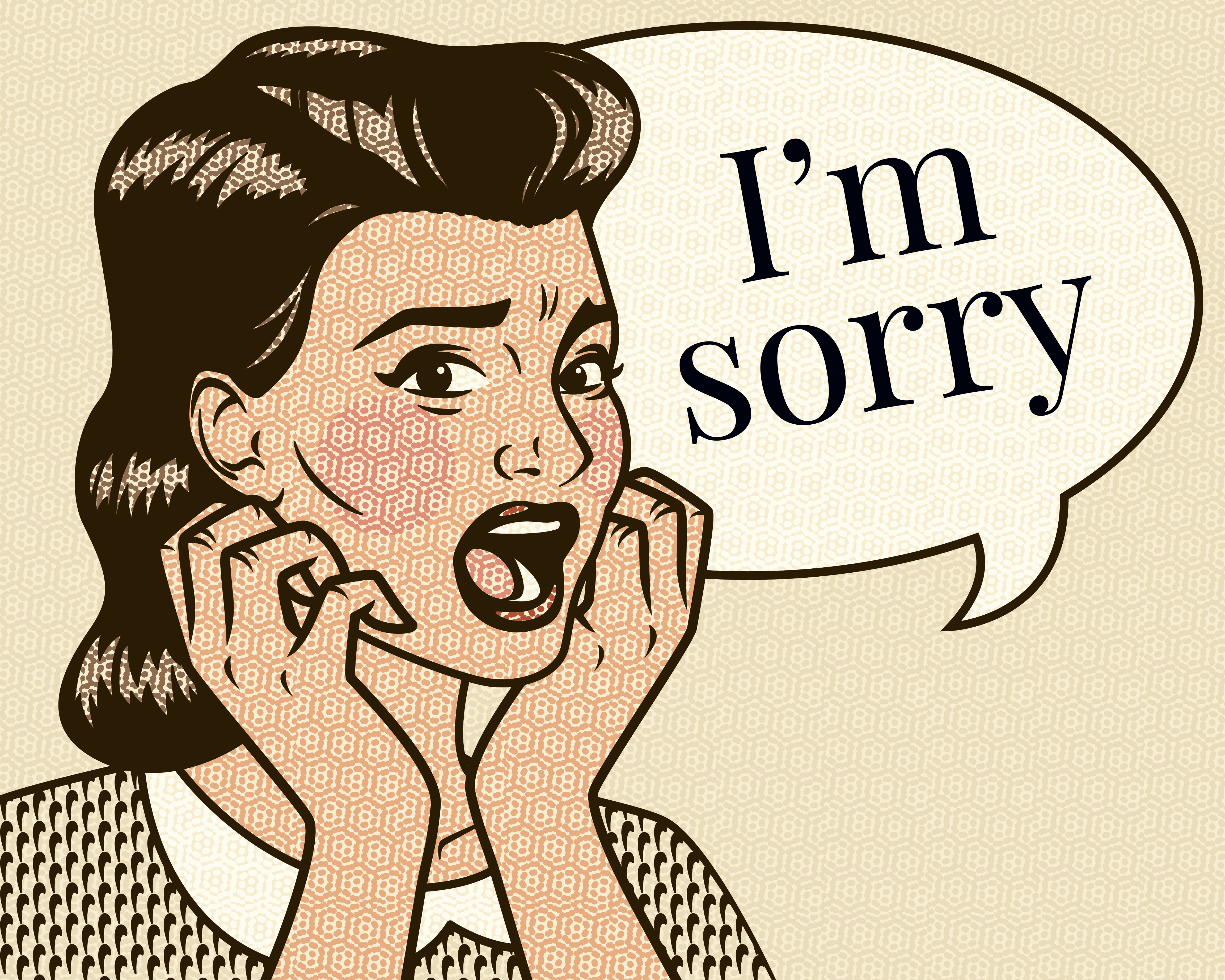Why do the English constantly say sorry?
What is that makes the people of this island so overly fond of apologising? Deborah Nicholls-Lee finds out.


As part of her research for her book Watching the English: The Hidden Rules of English Behaviour, Kate Fox set herself the unenviable task of deliberately bumping into unsuspecting members of the public to compare their reactions. ‘The English lived up to their reputation,’ she reports. ‘About 80% of my victims said “sorry” when I lurched into them, although the collisions were quite clearly my fault.’
Simply put, we are a nation of over-apologisers — or, as Max Davidson writes in Sorry: The Hardest Word and How to Use It: ‘If there were Olympic medals for saying sorry, we English would win gold, silver and bronze.’ We apologise when we make a request or a complaint, when something is spoken too softly for us to hear and even — as we’ve seen — when something unfortunate happens beyond our control. As Fox notes: ‘Any intrusion, impingement or imposition of any kind, however minimal or innocuous, generally requires an apology.’
According to a 2015 study across all categories of apology, from interrupting someone to inadvertently sneezing, I’m sorry to say that it is women who apologise the most. The same survey revealed that the British apologise 50% more than Americans. In fact, our propensity for apologising has a lot to do with our geography, argues etiquette coach William Hanson, whose book Just Good Manners steers readers through the minefield of proper behaviour. ‘We are a small island nation. We don’t have vast expanses of land to run away to if we annoy somebody,’ he explains. ‘We have to struggle on and we’re very conscious of that.’
Language expert Henry Hitchings, whose books include Sorry! The English and their Manners, agrees that it’s ‘living on a densely populated island’ that makes us so prone to apologising. ‘British people are — arguably — especially wary of encroaching on other people’s space,’ he reflects, going on to explain that it’s ‘a mechanism for avoiding confrontation’ and ‘an easy means of lubricating our everyday interactions’.
For Hanson, apologies are important to the English because they are bound up with our value system and our sense of good character. ‘We value civility and if we have been slighted, accidentally or on purpose, we like the fact that somebody is going to say sorry,’ he explains. ‘It’s being a nice human being.’ Public apologies by leadership figures also matter to us, however forced. We may never forgive the harm done, but we are compelled to extract the apology nonetheless.
It is important to note that all apologies are not equal. ‘A good apology addresses the harm that has been caused and seeks to rebuild trust,’ stresses Hitchings. ‘There should be an offer of repair and a commitment to do things differently in future.’ Yet Debrett’s, which has been instructing on good etiquette since the 1700s, counsels against over-indulging. ‘If you do make a social blunder,’ advises the Debrett’s Handbook, ‘apologise as quickly and sincerely as possible, but do not overdo it.’ Hanson concurs. Far from being a virtue, ‘over-apologising can dilute the currency or value of that apology,’ he states, emphasising that it is undesirable to ‘waffle’ and ‘over-explain’.
As for invitations, it is customary to apologise if you cannot attend, but brevity remains key. ‘A gentleman need not offer a lengthy explanation for his inability to accept the kindness of his host or hostess,’ prescribes the 2005 gentleman’s guide Toasts & Tributes. ‘He is perfectly correct simply to say: “I have another engagement.”’ Honesty, however, is not always the best policy. One can only imagine the face of the Prince of Wales, later Edward VII, who, having invited his friend Lord Charles Beresford to dinner, received a telegram that read: ‘Very sorry can’t come. Lie follows by post.’
Exquisite houses, the beauty of Nature, and how to get the most from your life, straight to your inbox.
For the often comedic ‘reflex apology’, Hanson makes another exception to the honesty rule, outlining a scenario where someone dithering at the top of an escalator causes us to hurtle into the back of them. Although insincere, as the mishap was not our fault, an apology is still better etiquette than a public display of anger. ‘If we give into that impulse, then we become America,’ he asserts. ‘What marks us out as British is we try as much as we can to temper those slightly rougher — but perfectly understandable — impulses.’
Even in this situation, a perfectly formed English apology steers clear of the ‘I’m sorry, but…’ formation. Such apologies simply ‘deflect blame,’ maintains Hitchings. ‘Conditional’ language, such as “I’m sorry if I caused offence”, is the hallmark of a bad apology, he says, as ‘this implies doubt about whether any harm was actually done’. That so many apologies risk being disingenuous — mere acts of expedience, rather than genuine remorse — is perhaps explained in part by an apology’s etymology. The Greek apologia from which the word derives — formed from apo (away from) and logos (speech) — translates rather tellingly as ‘a speech in defence’.
For wits such as Oscar Wilde, the ‘sorry, not sorry’, as we now know it, was an art form. ‘I am sorry my life is so marred and maimed by extravagance,’ he writes in a letter to theatre producer Sir George Alexander. ‘But I cannot live otherwise.’ Ostensibly polite it may be, but an apology is also an admission of guilt that can put you at a disadvantage. ‘It is a good rule in life never to apologise,’ writes P. G. Wodehouse in The Man Upstairs and Other Stories. ‘The right sort of people do not want apologies and the wrong sort take a mean advantage of them.’
None of this stops the English from saying sorry an average of eight times a day, as one study suggests. Over-apologising is a national habit that dies hard and cuts across all social classes. It was perhaps George V who took the convention to its most extreme, apologising on his deathbed: ‘Gentlemen, I am so sorry for keeping you waiting like this. I am unable to concentrate.’
Deborah Nicholls-Lee is a freelance feature writer who swapped a career in secondary education for journalism during a 14-year stint in Amsterdam. There, she wrote travel stories for The Times, The Guardian and The Independent; created commercial copy; and produced features on culture and society for a national news site. Now back in the British countryside, she is a regular contributor for BBC Culture, Sussex Life Magazine, and, of course, Country Life, in whose pages she shares her enthusiasm for Nature, history and art.
